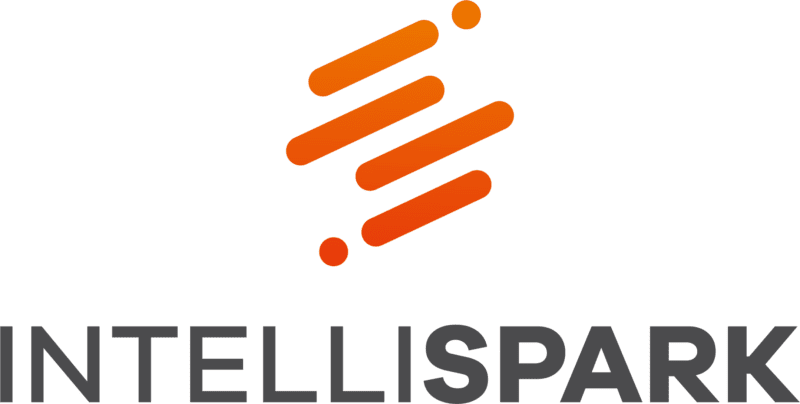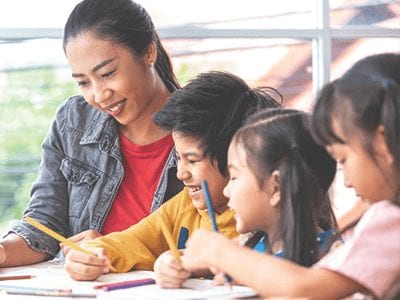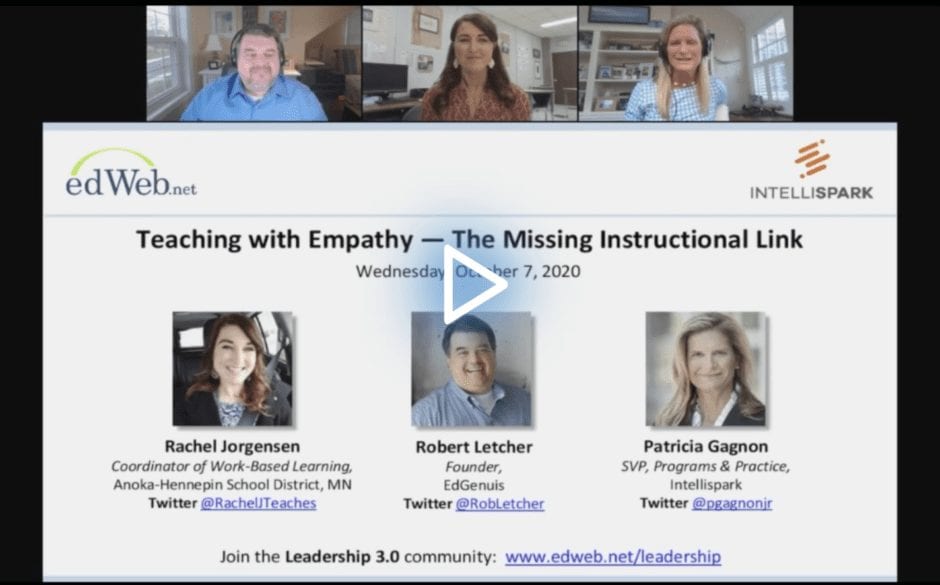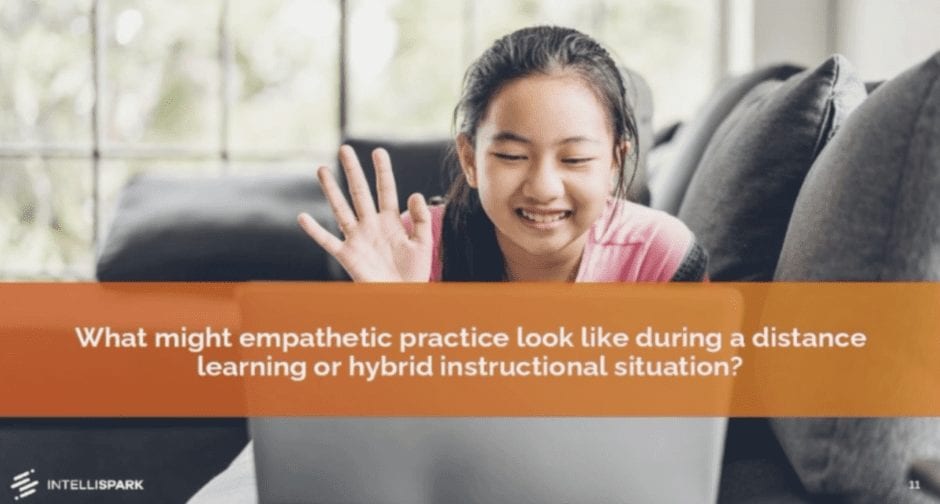Teaching with Empathy — The Missing Instructional Link
By Eileen Belastock
WATCH THE EDLEADER PANEL RECORDING
“No significant learning occurs without a significant relationship.” This quote by Dr. James P. Comer highlights the importance of strong teacher-student connections. In an edWeb edLeader Panel, sponsored by Intellispark, the presenters concurred with Comer that it is now even more critical to monitor student wellbeing and maintain healthy relationships.
Our charge as educators is to transition back to school as a positive opportunity for all students and foster a healthy mindset for ourselves, our colleagues, and our families. The presenters have embraced in their work with teachers the importance of relationships in the classroom to ensure a healthy learning community. Teaching with empathy is the key that unlocks authentic connections with each student to foster their sense of belonging and engagement regardless of their learning environment.
Awareness
By inviting students to share unique perspectives and developing an empathetic lens, educators can strengthen teacher-student relationships and ensure that all students are engaged and connected to their learning. Students will only share their unique perspectives in environments where they feel safe. Robert Letcher, Founder of EdGenuis, says it is imperative that students feel valued, respected, and cared about, whether in a face-to-face or online learning environment. This empathic approach to building relationships is evident in classrooms where both teachers and students share their life experiences and understand each other’s differences.
Rachel Jorgensen, Coordinator of Work-Based Learning for the Anoka-Hennepin School District (MN), points out that students are coming into our learning community with unique needs, and all of their actions and communication is to try to get those needs met. The presenters agree that healthier classroom communities happen when educators develop curricula and lessons through the lens of what their students might need and how to meet those needs. The challenge is that we, as educators, often assume that students live the lives that we lived as children. An empathetic approach to teaching is being aware of how students’ own cultures, lives, and families have affected them. How children are brought up in their culture impacts their ability to learn, experience content, and master understanding. Only by utilizing a universal design strategy of providing multiple manners in which content is delivered can students connect with and understand the content.
Learning Environments
Empathetic practice during a distance-learning or hybrid instructional situation includes providing empathy towards both students and parents. During this pandemic, parents are stressed in online learning and can be the weak link if left out of the educational process. Connecting to families, providing training, and being conscious of home situations can ensure healthy relationships. The presenters emphasize that at this moment in time, with everything students are experiencing and everything going on in the world, placing connection in front of content is a very productive choice for educators to make. Jorgensen recommends that educators prioritize the curriculum, determine what is essential right now, and introduce non-essential content when all students are back in the face-to-face learning environment. An empathetic educator would give themselves a permission slip to be flexible and make adjustments and prioritize.
Action Steps
There are steps that educators can do now to ensure that they are teaching with empathy. In a safe environment, ask questions and engage in active learning that invites students to share thoughts and experiences about themselves. Pre-reflect on lessons to consider all learners with diverse perspectives, needs, and resources and ensure a balance of content and connections. Reflect after each lesson to assess their understanding of student perspectives and determine where adjustments are needed to ensure student connections. Offer avenues for students to provide feedback on lessons—and welcome it!
This edWeb broadcast was sponsored by Intellispark.
WATCH THE EDLEADER PANEL RECORDING
This article was modified and published by eSchool News.
About the Presenters
Rachel Jorgensen is an educator with experience in instructional coaching and teacher leadership with a particular interest in developing equitable practice, culturally responsible teaching, and a focus on college and career readiness. She currently serves as Coordinator of Work-Based Learning in a large Minnesota suburban district which offers her the chance to connect with students on a deep level. Leveraging student strengths and individualizing instruction to meet student needs are at the heart of her philosophy of education. She is grateful to invest her career in helping students find theirs.
Rob Letcher is the founder of EdGenius and is an instructional designer at Junior Achievement. He is a former Sr. Director at K12, Inc. With 23 years of experience in education, Rob has spent 18 of those online teaching and learning. A former school teacher, administrator, curriculum designer, instructional designer, teacher educator, and product manager, Rob’s expertise is both broad and deep. He is also serving as a teacher’s aide to his three children’s normally classroom-based teachers.
Patricia Gagnon is the SVP of Programs & Practice at Intellispark. She has worked in education for nearly 30 years, first as a department chair and teacher of high school English and Latin in RI public schools and then overseeing the development of online learning, student success, and college and career readiness solutions for K-20 students in multiple education technology organizations. She continues to explore how to effectively support her own five-year-old’s home learning adventure.
Join the Community
Leadership 3.0 is a free professional learning community on edWeb.net where school and district leaders collaborate on innovative strategies to help teachers grow professionally, advance student learning, and improve communications with all stakeholders.

Eileen Belastock, CETL is the Director of Technology and Information for Nauset Public Schools, MA, and also works with edWeb.net to write articles on their professional learning edWebinars. You can follow Eileen on Twitter @EileenBelastock.





Comments are closed.